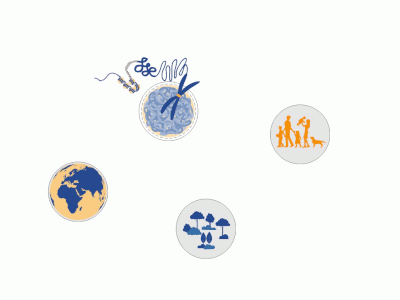Watch our video and get a glimpse into life at EpiCrossBorders
Click here to watch our video
'One Health' and the Field of Epigenetics

We are all connected! Not just people, but all organisms and their environment. For example, disruptions in environmental conditions and habitats can have great influence on species composition, the spread of diseases or food production. Thus, to obtain optimal health outcomes, we need a collaborative, multisectoral and transdisciplinary approach and multiple scales that recognizes the interconnections between all species: the ‘One Health’ approach.
But what are the mechanisms behind the interactions between species and their environment, and how can we study them?
A major interface of the interconnections between species and their environment is through epigenetic processes. Epigenetic mechanisms allow cells to react to their direct environment and adjust gene expression programms. Hence, as individual cells and organisms shape their environment, so may the environment shape gene expression profiles of individual cells and organisms via epigenetic mechanisms. Our understanding of these processes is crucial to improve our understanding of e.g. the development of common diseases, such as diabetes and cancer, and to better understand and predict the consequences of climate change.
This puts the multidisciplinary field of epigenetics at the heart of the 'One Health' approach to address major current and future challenges.








